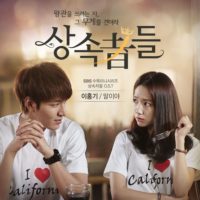Discovering Hallyu

I have just finished watching The Heirs (2013), and for the first time with a K-drama I don’t want to give it a proper review, even though there is a LOT that I could say about it. It just has so many problems and I fear a review would only encourage other people to watch it. Which has got me thinking more generally about my K-drama fixation.
It can’t have escaped anyone’s notice that this past few months I have immersed myself in K-drama, and generally become super-interested in Korean life and culture. The Korean Wave (Hallyu) has most definitely found me. But why would a feminist like me swoon over these shows that are not only repetitive and cliched, but commonly outright misogynist and selling dangerous ideas to the Korean youth they are aimed at?
First, let me back up the second part of that question with some examples. K-dramas are all about romance, but that romance usually begins with a man who is in a position of power over the woman (in almost every case I’ve seen the man is super-rich while the woman is poor) repeatedly grabbing her wrist and dragging her around; claiming ownership of her when she has not expressed any interest; and forcibly backing her into kisses that she does not want or respond to. Even more worryingly, said woman then always falls for the man in question and looks back on those forced kisses as beautiful moments.
The lead women in K-dramas tend to be quiet and submissive, and even those who start out being a little outspoken and capable generally devolve into passive empty shells as they are broken down by the male leads’ abusive, stalkerish behaviour. The musical soundtrack and spinning camerawork or slow motion make it clear that viewers are meant to see these abusive moments as romantic. It’s hard not to consider all this as a real problem when you read that in Korea violence against women is common after a break-up (and probably within relationships too, though stats on that are always harder to obtain).
So how do I justify loving these dramas, or at least finding them addictive and fun? Well, I have been trying to find K-dramas that buck these trends and thanks to some judicious googling, I have found a few. The best series I have seen when it comes to these issues is Hello, My Twenties!, which not only includes zero wrist grabs, forced kisses or similar moments, but does include a storyline about domestic abuse that 100% depicts the abuser as an entitled violent asshole and his victim as a wholly rounded person who takes a year of therapy and close female friendship to move on with her life. In a largely comedic TV show, this was handled so well that I got a bit of whiplash when I followed it up with The Heirs, one of the worst offenders when it comes to misogynist behaviour disguised as romance.
But I guess I must admit that I can also look past some of this behaviour and enjoy the other common elements of these shows: excellent production values; good K-pop soundtracks; characters who evolve; storylines that are properly wrapped up; lots of delicious-looking food; and of course the Hallyu element – getting to know a place and culture that I previously didn’t know at all.
As I said back when I watched my first K-drama in September, I could not in all conscience recommend this genre to anyone aged under 25, for fear of spreading ideas about gender that I absolutely disagree with. But I have noticed that the more recently made K-dramas I have watched seem to have fewer of these issues, so hopefully that trend will continue, and there will instead be more romances on a proper equal footing, like the one in Weightlifting Fairy Kim Bok-joo; or more shows where romance isn’t the central plot device, like Hello, My Twenties!
Once again I am open to suggestions of non-misogynist K-dramas to watch. I want to continue finding and writing about the Korean shows that do break the mould, to do my tiny little bit to boost their viewing figures and hopefully encourage more of their kind to be made.